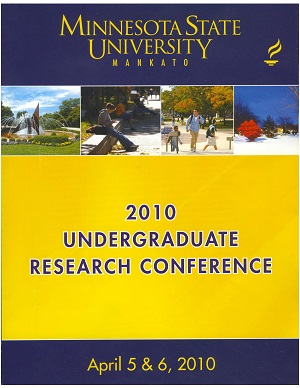IMR Deconstruction and Reconstruction: Mental Health Group Recovery
Location
CSU 201
Start Date
5-4-2010 8:30 AM
End Date
5-4-2010 10:00 AM
Student's Major
Social Work
Student's College
Social and Behavioral Sciences
Mentor's Name
Christine Black-Hughes
Mentor's Department
Social Work
Mentor's College
Social and Behavioral Sciences
Description
In recent years the recovery process of people with mental illness has been extensively researched. Program models such as Illness Management and Recovery (IMR) have been proven to be successful with a high degree of fidelity. The overall goal of this project is to design client and clinician manuals based on IMR that allow the modules to be implemented in groups. The ten IMR modules will be reconstructed into four 12- week group sessions for Transition Services (TS) at St. Peter Regional Treatment Center (SPRTC). It is expected the curriculum constructed will be implemented to provide TS with an evidence based curriculum. The student researchers will reconstruct ten IMR modules into a client and clinician manual that are written specifically for Transition Services (TS) at St. Peter Regional Treatment Center (SPRTC). The impact of TS utilizing the manuals will be the provision of an evidence based curriculum. It is expected the curriculum in the manuals will be implemented. Currently, the programming at SPRTC is not evidence based and the recovery rate of the clients is undetermined. By using and evaluating the reconstructed IMR modules the staff at SPRTC will be able to initially establish a baseline for client recovery which will be used for a comparison studies of client recovery rates in the future.
IMR Deconstruction and Reconstruction: Mental Health Group Recovery
CSU 201
In recent years the recovery process of people with mental illness has been extensively researched. Program models such as Illness Management and Recovery (IMR) have been proven to be successful with a high degree of fidelity. The overall goal of this project is to design client and clinician manuals based on IMR that allow the modules to be implemented in groups. The ten IMR modules will be reconstructed into four 12- week group sessions for Transition Services (TS) at St. Peter Regional Treatment Center (SPRTC). It is expected the curriculum constructed will be implemented to provide TS with an evidence based curriculum. The student researchers will reconstruct ten IMR modules into a client and clinician manual that are written specifically for Transition Services (TS) at St. Peter Regional Treatment Center (SPRTC). The impact of TS utilizing the manuals will be the provision of an evidence based curriculum. It is expected the curriculum in the manuals will be implemented. Currently, the programming at SPRTC is not evidence based and the recovery rate of the clients is undetermined. By using and evaluating the reconstructed IMR modules the staff at SPRTC will be able to initially establish a baseline for client recovery which will be used for a comparison studies of client recovery rates in the future.
Recommended Citation
Harding, Lauren and Renee Lips. "IMR Deconstruction and Reconstruction: Mental Health Group Recovery." Undergraduate Research Symposium, Mankato, MN, April 5, 2010.
https://cornerstone.lib.mnsu.edu/urs/2010/oral-session-01/1




